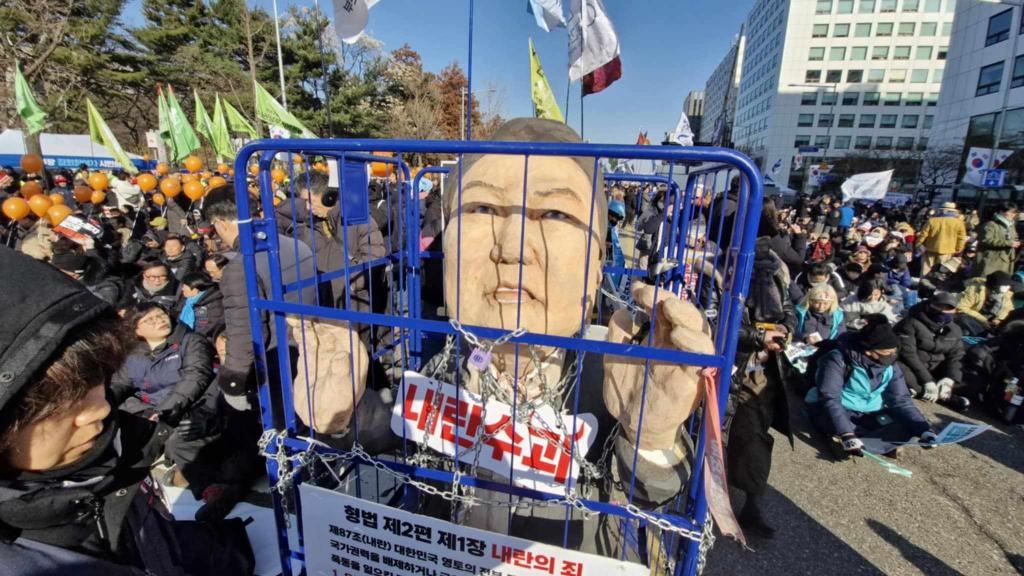South Korea: Yoon’s impeachment is a win for people’s power

Wave after wave of protesters arrived by foot on Seoul’s Yeouido Island shortly after noon on December 14, with subway trains again forced to bypass the local station to avoid overcrowding. As with the million-strong rally the week before, candle-carrying protesters surrounded parliament to see if this time President Yoon Suk-yeol would be impeached.
At about 5pm, their demand was finally met when 204 parliamentarians voted for impeachment (with 85 against, 3 abstaining and 8 casting null votes). Then, at 7:24 pm, a parliamentary delegation delivered the impeachment bill to the presidential office, officially suspending Yoon’s presidency. With this, the constitutional crisis that opened with Yoon’s December 3 attempted self-coup was over.
Another show of popular will
Prior to impeachment, the political situation had become increasingly tense, with angry people gathering in scores of cities across South Korea. Members of the Korean diasporas also held candlelight protests in Paris, Berlin, London, New York, Sydney, Melbourne and many other cities around the world.
But the focus was the avenues and boulevards around parliament, where organisers estimate 2 million people gathered after marching from all directions, yelling “President, resign!” and “Impeach Yoon Suk-yeol”. Colorful glow sticks, candles, banners, hand bills and flags dominated the scene while hundreds of volunteers helped keep order. There were so many people it was extremely difficult to move.
In a genuinely beautiful moment of people’s power, people from all walks of life — students, trade unionists, pensioners, young women — came together to demand Yoon’s immediate resignation and impeachment. Having achieved their demand, they went home happy, their hearts filled with hope, while younger protesters hung back to celebrate late into the chilly night.
In contrast, a much smaller rally of less than 50,000 Yoon supporters gathered in downtown Gwanghwamoon. Expressing anger at impeachment, they could do little but go home feeling a strong sense of helplessness and painful despair.
Last gasp resistance
Having apologised for the self-coup several days ago, Yoon changed his tone and sought to justify it as legitimate. Since December 3, he had stubbornly refused to resign.
Views within the ruling People Power Party (PPP) were divided over impeachment. PPP leader Han Dong-hoon favoured impeachment, but his supporters were a minority within the party. On the other hand, newly elected pro-Yoon PPP parliamentary leader Kweon Seong-dong wanted to stop impeachment by any means possible.
On December 7, the PPP successfully sabotaged impeachment by boycotting the vote in parliament. Going into the December 14 vote, seven rebel PPP MPs announced they would break ranks, meaning only one more vote was required for impeachment.
Seeking to stop this, the PPP parliamentary bench held an emergency assembly, which ran right up until 4pm when parliament was scheduled to convene. While maintaining its anti-impeachment position, the PPP decided this time it would not boycott the vote.
When the vote finally came, 12 PPP MPs voted for impeachment, with several more abstaining or casting null votes in what many viewed as a protest against official PPP policy. In the end, 85 MPs (mostly from the PPP) refused to respect the people’s will and instead pursued their own private and partisan interests by voting against impeachment.
After Yoon’s impeachment, the PPP’s five Supreme Council members resigned, triggering the dissolution of the party’s leadership and forcing Han to step down. The PPP is clearly facing a critical — perhaps terminal — crisis, one that has revealed the true ugly face of South Korea’s reactionary conservatism.
The struggle continues
It took 11 fateful days from Yoon’s failed self-coup to impeach him. The PPP tried everything it could to ignore public opinion and stop impeachment. Despite internal debates, the ruling party’s anti-impeachment policy never shifted, and right to the end 85 extreme right-wing MPs resolutely stuck to it.
Contrary to its name, the PPP persistently refused to submit to people’s power, preferring instead to commit slow political suicide. Even now, the pro-Yoon faction is seeking revenge against renegade MPs who voted for impeachment.
For now, attention will turn to the Constitutional Court, which will take a few months to deliver a final verdict on impeachment. In the meantime, people will remain alert, watching the case attentively, ready to mobilise to defend democracy and their 2024 candlelight revolution victory.
Yoon’s self-coup has shown the inherent weakness of South Korea’s institutional democracy. At the same time, his impeachment has demonstrated the robust resilience of people’s grassroots democracy, nationally and internationally.